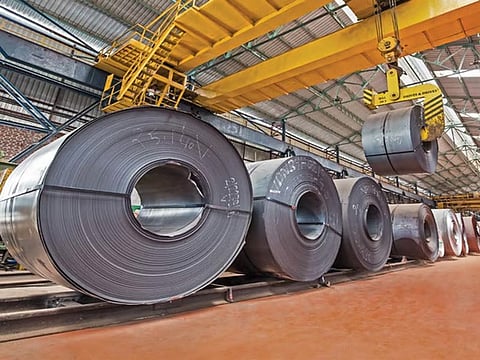

NEW DELHI: India is likely to impose higher import duty on specific goods from the European Union (EU) in retaliation to the EU's extension of safeguard duties on 26 steel items, significantly impacting India’s steel exports. The safeguard duty will remain in place until June 2026.
India's steel industry is already struggling with cheap imports from China and is facing challenges in meeting the requirements of the EU's Carbon Border Adjustment Mechanism (CBAM), set to take effect in January 2026. The EU’s safeguard measures, which have been in place since 2018 have drastically reduced India’s export volumes to the EU, causing significant financial losses.
According to Ajay Srivastava, founder, Global Trade Research Initiative (GTRI), the EU’s safeguard measures are designed to protect its domestic steel industry from an oversupply of cheaper imports. These measures apply to 26 categories of steel products, including non-alloy and alloy hot-rolled sheets, cold-rolled sheets, metallic coated sheets, organic coated sheets, and other key steel products.
The EU has established import quotas for each steel product by country, with in-quota imports facing a 0% duty. However, once imports exceed the quota, an out-of-quota duty of 25% is imposed. The quota amounts vary depending on the product category and the exporting country.
For India, these safeguard measures have been costly. India estimates that its steel exports to the EU have faced a cumulative trade loss of USD 4.412 billion from 2018 to 2023. In this period, the EU has collected duties amounting to USD 1.103 billion on Indian steel exports.
In response, India has notified the World Trade Organization (WTO) on 17 September 2024 of its intention to take retaliatory action under Article 12.5 of the Agreement on Safeguards.
According to GTRI, India’s proposed action involves suspending trade concessions on selected EU products, with plans to raise tariffs on these imports. The tariff increases will be proportional to the trade losses incurred due to the EU’s safeguard measures and may be adjusted in response to future developments. India’s response comes after the EU extended its safeguard measures, which were originally set to expire in June 2024, for an additional two years until June 2026.
India had earlier imposed retaliatory tariffs on imports from the United States on 16 June 2019 after the US imposed tariffs on Indian steel and aluminium. The US had imposed a 25% tariff on steel and a 10% tariff on aluminum imports from several countries, including India, citing national security concerns. In retaliation, India raised tariffs on 28 U.S. products, including almonds, apples, walnuts, chickpeas, and certain chemicals. India's retaliatory tariffs were aimed at offsetting the impact of the U.S. tariffs on Indian steel and aluminum exports.